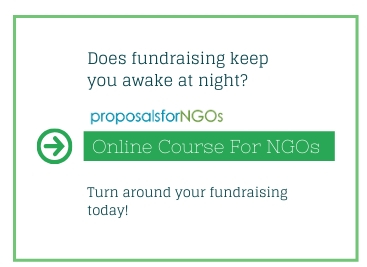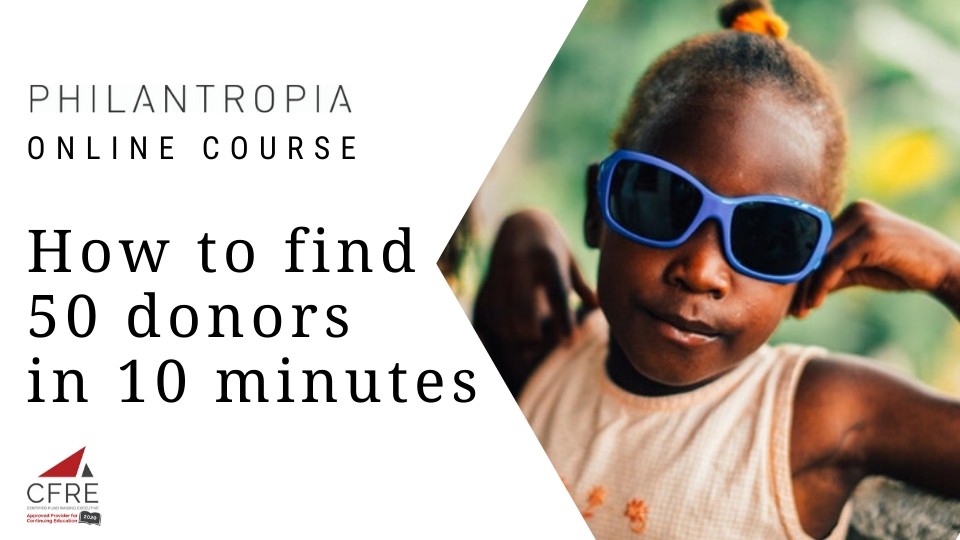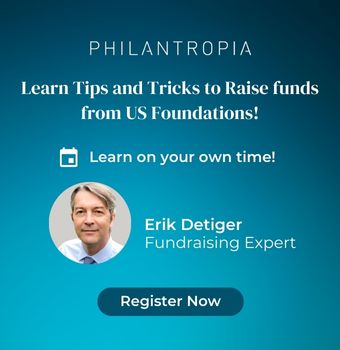Many smaller NGOs, often grass-roots, with small budgets, have difficulty finding funds for their projects. Their capacity to research donors is limited. They also feel that most donors prefer giving large grants to well-known NGOs. At the same time, thousands of small NGOs around the world are successfully attracting small grants from interested donors. How do they manage this?
This guide is a valuable resource for individuals and organizations seeking to secure funding through small grants. Whether you are a grass-roots organization or an individual seeking support for a specific project or activity, this guide can help you to navigate the grant-seeking process and apply for small grants.
What is a small grant?
Although there is no formal definition of a small grant, for the purpose of this guide we will assume small grants range from $100 to $25,000. A small grant is a type of funding that is typically provided to non-profit organizations, community groups, or individuals for specific projects or activities. These grants are usually smaller in size and scope compared to larger grants and are often provided to support projects or activities that have a local or community focus. We can assume that small grants are typically earmarked for small local NGOs with limited budgets.
Small grants can be an important source of funding for non-profit organizations, community groups, and individuals, and can help to support a wide range of initiatives and activities, promoting positive change on a local and global level. Small grants play an important role in supporting a wide range of initiatives and activities and can help to build stronger communities and promote positive change on a local and global level.
Why would funders give to small NGOs?
It is a common perception among small NGOs that they are at a disadvantage when it comes to fundraising compared to large high-capacity NGOs. This perception is often based on the belief that donors are more likely to support larger, more established organizations with a proven track record of success. Small NGOs may feel that they lack the resources, expertise, and capacity to compete for funding with larger NGOs. Our research indicates that this is not necessarily the case and that donors around the world are providing small grants to NGOs (see below).
What could be some of their reasons?
- The donor has limited resources and only gives away small amounts
- The donor is interested in helping small NGOs that work at the grassroots level
- The donor feels small organizations are more nimble and can work more effectively
- The donor feels they will be more influential in funding a smaller NGO
- Smaller NGOs work in the specific area the donor is interested in
- The donor wants to spread its wealth (give small amounts to many NGOs) and many more…
Where do I start?
When seeking funding for your NGO, it is essential to clearly develop the program that requires funding. Without a well-defined program, it can be challenging to identify a good donor and submit a successful application.
To develop a program that is attractive to potential donors, you need to be very clear about what it is you are going to implement and what results (impact) the program is going to achieve. This means being specific about the target population you will be serving, the problem you are seeking to address, and the activities and strategies you will be using to achieve your goals.
In order to clearly develop your program, it can be helpful to follow a structured process. Here are some steps you may consider taking:
- Assess the Need: Start by conducting a needs assessment to determine the specific social or environmental problem you want to address. This will help you identify the target population and the root causes of the problem.
- Set Goals and Objectives: Once you have identified the problem, set clear goals and objectives for your program.
- Develop a Logic Model: A logic model is a visual representation of how your program will work. It should show the relationship between inputs (resources), activities, outputs (products or services), and outcomes (short-term, medium-term, and long-term). Developing a logic model can help you refine your program and ensure it is logically structured and coherent.
- Define Your Budget: Determine the cost of implementing your program, including the costs of staff, materials, equipment, and other expenses. Make sure that your budget is realistic and aligned with your goals and objectives.
- Develop a Monitoring and Evaluation Plan: A monitoring and evaluation plan outlines how you will track and measure progress toward your goals and objectives. It is important to include this plan in your program to demonstrate to donors that you have a clear plan for assessing the impact of your program.
How much do we need?
Determining how much funding you need for your NGO depends on several factors, including the specific goals and objectives of your program, the target population you will be serving, and the resources required to implement your program successfully.
Here are some steps to help you determine how much funding you need:
- Develop a Budget: The first step is to develop a detailed budget that outlines all the costs associated with implementing your program. This includes personnel, materials, equipment, travel, and other expenses. Include both direct and indirect expenditures, as appropriate.
- Estimate Cash Flow: Cash flow refers to the timing of your expenses and income. Estimate when you will receive funding and when expenses will be incurred. This will help you determine how much funding you need upfront and how much you will need over time.
- Consider Risks and Contingencies: When developing your budget, it is essential to consider any risks or unforeseen events that could impact the success of your program. Include a contingency fund to cover unexpected expenses or delays.
- Look for Matching Funds: Many donors require NGOs to provide matching funds or in-kind contributions as a condition for funding. Be sure to factor in any matching funds or in-kind contributions when determining how much funding you need.
- Review Other Funding Sources: Consider other funding sources that may be available to you, such as grants from foundations, government programs, or corporate sponsors.
Research
Although it is challenging to locate precise data on the ratio of small to large funds, an examination of US Foundation grants to Tanzanian NGOs is useful. Nearly 60% of the 490 grants awarded to NGOs in Tanzania since 2003 were small grants (under $5,000, under $10,000, under $15,000, and under $25,000 for 8%, 19%, 41%, and 58%, respectively). Although there are numerous donors who effectively give small amounts to NGOs, only one example demonstrates this.
So now we know that donors do give small grants, but how do we find them?
- Check websites and annual reports of NGOs that are of a similar size and scope to your NGO to check who funds them
- Check databases of funders (e.g. the Foundation Center Directory of Foundations in the US)
- Check donor websites for guidelines and funding criteria
- Ask peers and colleagues for suggestions
- Sign up for newsletters that provide funding information on small grants
How to find 50 donors in 10 minutes
Fundraising is hard! Especially when you have many other things to do, it can be challenging to allocate enough time to find great donors and prepare a winning proposal! In this free online course, we will share a trick with you that will save you a lot of time! Find 50 great donors in only 10 minutes and move straight to the next stages of your fundraising cycle! Our experienced instructor Erik Detiger will share his insider knowledge with you so that you don´t have to make the same mistakes we all made when we were learning donor research!
This course is totally free of charge, so it is a great way to learn something new and get to know our online courses.
Next steps
How do I contact these donors?
Once you have identified a list of potential donors, reach out to them. Email or phone them and request a meeting in person (if they are located in the country/city where you work) or by phone/Skype (if they are located elsewhere). Decide when to contact this donor again. Once you get in touch, be sure to enquire further about their objectives and strategies — what do they need from an NGO? Next, provide information on your NGO and project, and then propose to send them a short concept note that outlines a program in which they could be interested.
What shall we send them?
Send the donor a concept note that summarizes the program and budget. Sending a lengthy proposal with annexes is not appropriate unless they specifically request it. A proposal with annexes typically contains a detailed breakdown of the program activities, a budget, and other supporting materials such as organizational profiles, letters of support, and strategic plans.
Getting to a “yes.”
If the donor is not interested, thank them for their consideration of your proposal and let them know you will follow up with them later. About six months later, try again with a modified or different idea. This time frame allows the organization to make necessary revisions and adjustments to the proposal based on the feedback received from the donor. It also allows the organization to continue building relationships with donors and stay on their radar for future funding opportunities. Don’t quit up too soon because “no” frequently implies “not now.” Cross your fingers that they say yes!
Foundations that provide Small Grants to NGOs
GEF Small Grants Programme The GEF Small Grants program was established in 1992, the year of the Rio Earth Summit. The GEF Small Grants Programme is missioned towards sustainable development by “thinking globally acting locally” by providing financial and technical support to projects that conserve and restore the environment while enhancing people’s well-being and livelihoods. United Nations offers the grant on an annual basis to developing countries of up to $50,000 directly to local communities including indigenous people, community-based organizations, and other non-governmental groups. The Small Grants Program has provided over $724.91 million to more than 26,429 projects around the world.
Rufford Small Grants Foundation The Rufford Foundation is a UK-registered charity that funds nature conservation projects across the developing world. The Foundation encourages the sharing of knowledge and best practices throughout the conservation world. The Rufford Small Grants Foundation provides funds to individuals or small groups like NGOs and CBOs of developing countries. The grant is given in a staged funding process with five different types of grants: Rufford Small Grants (up to £6,000), 2nd Rufford Small Grants (up to £6,000), Booster Grants (up to £12,000), Continuation Grants (up to £25,000) and Completion Grants (up to £25,000).
Humanitarian Innovation Fund The Humanitarian Involvement Fund (HIF) was established in the year 2011, it aims to provide small grants for those countries, which are in humanitarian need. Most developing countries are not able to focus on the needs of people such as food health, shelter, and security. The HIF has been playing an important role by supporting organizations that work to address the issues of humanitarian needs in developing countries. HIF encourages partner organizations and the private sector to positive changes.
Nederlands Albert Schweitzer Fund Respect for all Life by Albert Schweitzer, winner of the Nobel Peace Prize in 1952. The philosophy is continued by the Dutch Albert Schweitzer Fund (NASF). It supports small-scale health projects in Sub-Saharan African countries. Various diseases that could have been prevented have led to the death of people due to a lack of resources in Africa. Nederlands Albert Schweitzer Fund aims to implement projects related to healthcare for the improvement of people’s health and the healthcare systems in Africa.
Go. Go Love Go. Go Love is a privately funded foundation that aims to create a little more love to share throughout the world, where Injustice and inequality have been critical. They believe that, as long as poverty, injustice & inequality exist in this world, none of them can share love with each other and move to the path of progress. We need to love all people, our innovation, ideas, passion, and our surrounding for a positive change in the world.
They support small to medium non-profit and non-government organizations working in developing countries. They believe, working together is the most valuable tool for community development work. To provide organizations and communities the means to work together in achieving positive changes and improving the overall quality of life is their mission.
SGP The Small Grants Program SGP small grants program was established in the year 1992, the year of the Rio Earth Summit, it signifies the core of sustainable development by “thinking globally acting locally”. With consideration of environmental degradation as the degradation of the ecosystem, SGP aims for the balance between human needs and environmental imperatives. Through the support of those projects that work for the conservation and restoration of the environment while enhancing the people’s well-being and livelihood.
The program encourages reducing the life-threatening challenges that endanger every species depending on and surrounded by the environment. It directly provides grants of up to $50,000 to local communities including indigenous people, community-based organizations, and other non-governmental groups for projects in Biodiversity, Climate Change Mitigation and Adaptation, Land Degradation and Sustainable Forest Management, International Waters, and Chemicals.
First published on Proposalsforngos.




Fostering Change: The Role of Diversity, Equity, and Inclusion in NGOs - Philantropia
[…] is to bring positive change to the world through equal treatment and opportunity. In this regard, NGOs need to address various societal challenges and issues. To fulfill their mission and create a […]
Understanding Endowment for NGOs - Philantropia
[…] NGOs with an endowment fund help to secure funding to run their program activities, it should be careful […]